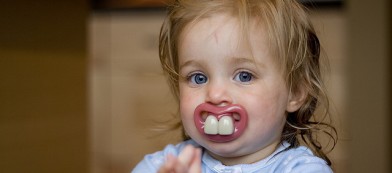Parents may protect babies against future allergies by sucking on kids’ pacifiers
To protect a baby against future allergies, parents may want to consider sucking on their kid’s pacifier.
New research finds kids whose parents “cleaned” their child’s pacifier by sucking it were less likely to develop asthma, eczema and food allergies when compared to kids whose parents opted to avoid the not-so-pleasant-sounding cleaning method.
“We demonstrate that a common parental practice, sucking on the infant’s pacifier before it is given back to the infant, is associated with protection against early eczema development and asthma symptoms,” wrote the researchers, led by Dr. Bill Hesselmar, a pediatric allergist at the University of Gothenburg in Sweden.
For the study, researchers enlisted a pool of 184 Swedish infants that weren’t born prematurely. Eighty percent of the children had at least one parent who already had allergies.
Infants were tested for food and airborne allergies at ages 18 months and 3 years old. Parents kept detailed diaries of their child’s upbringing for the first 12 months of their lives, including whether they developed illnesses or took medications. Parents were also interviewed beginning when their child was 6 months old, and two questions asked were: “Does the child use a pacifier?” and “Is it cleaned by boiling, rinsing in tap water, or by the parents sucking on it?”
Almost seventy-five percent of infants studied used a pacifier during the first six months of their lives. Most of the parents rinsed the pacifier in tap water, but approximately half of parents also boiled it and another 65 of them turned to mouth “cleaning” the pacifier.

Children whose parents sucked on pacifiers were about 88 percent less likely to have asthma and 63 percent less likely to have eczema and also were less likely to display sensitization to food allergens - an immune response indicative of allergies - at age 18 months than children whose parents did not engage in this practice. Protection against eczema remained statistically significant for infants in the pacifier-sucking group through the time they turned 3, the researchers found.
Boiling the pacifier was associated with a slight increase in asthma rates, but the researchers said it was not statistically significant and that finding may be due to chance.
Additional DNA tests revealed children whose parents cleaned the pacifier by sucking had different bacteria and germs in their mouths—called “microbiota”—than those whose parents did not suck on pacifiers. The researchers also observed a protective effect against asthma and eczema in children born vaginally as opposed to through a cesarean-section. The authors found both having a vaginal birth and sucking on a child’s pacifier amounted to a 2.5-times reduced likelihood the child develops eczema.
The new research was published May 6 in Pediatrics.
The study ties into the so-called “hygiene hypothesis,” a theory which states early exposure to germs and bacteria may strengthen a child’s immune system, thereby reducing allergies later in life.
Recent research found children who grow up in poverty are less likely to develop peanut allergies than those who grew up in higher-income households because of differences in potential germ exposure. A study last month found children born in the United States were more likely to have allergic hay fever, eczema, food allergies and asthma than children born outside the United States who immigrated, with one expert theorizing poor U.S. diets or the hygiene hypothesis may be at play.
One Canadian professor recently made headlines by wondering aloud whether children who pick their nose and eat their “boogers” may be less likely to develop allergies because of the hygiene hypothesis.
The authors concluded, “Further studies are now required to establish if parental pacifier sucking could be a simple and safe method to reduce allergy development in infants and young children, as our study suggests.”
Some doctors have warned parents against similar methods, like sharing eating utensils with young children, because disease-causing germs made be spread this way.
Dr. Joel Berg, president of the American Academy of Pediatric Dentistry, told the New York Times that efforts to stop parents from spreading germs to their children through sharing utensils - or pacifiers - are misguided.
“This notion of not feeding your baby with your spoon or your fork is absurd because if the mom is in close proximity to the baby you can’t prevent that transmission,” he said. “There’s no evidence that you can avoid it. It’s impossible unless you wear a mask or you don’t touch the child, which isn’t realistic.”
One expert not involved in the study echoed the authors by calling for more research to determine the safety and effectiveness of this cleaning method.
“We know these bacteria are important for development,” Dr. Wilfried Karmaus, a professor of epidemiology who researchers asthma and eczema at the University of South Carolina in Columbia, told Reuters. “It could be that these parents have more time with their children, a less stressful relationship with their children, hug their children more or whatever,” he said.
The American Dental Association, however, does not want parents to try this at home. The organization said sucking on a child’s pacifier before giving it to them is a good way to spread bacteria that causes Tooth decay.
“A child’s teeth are susceptible to decay as soon as they begin to erupt,” Dr. Jonathan Shenkin, a pediatric dentist in Maine and a spokesperson for the ADA, said in an emailed statement. “Cavity-causing bacteria, especially Streptococcus mutans, can be transferred from adult saliva to children, increasing their risk of getting cavities.”
###
CBS Interactive Inc